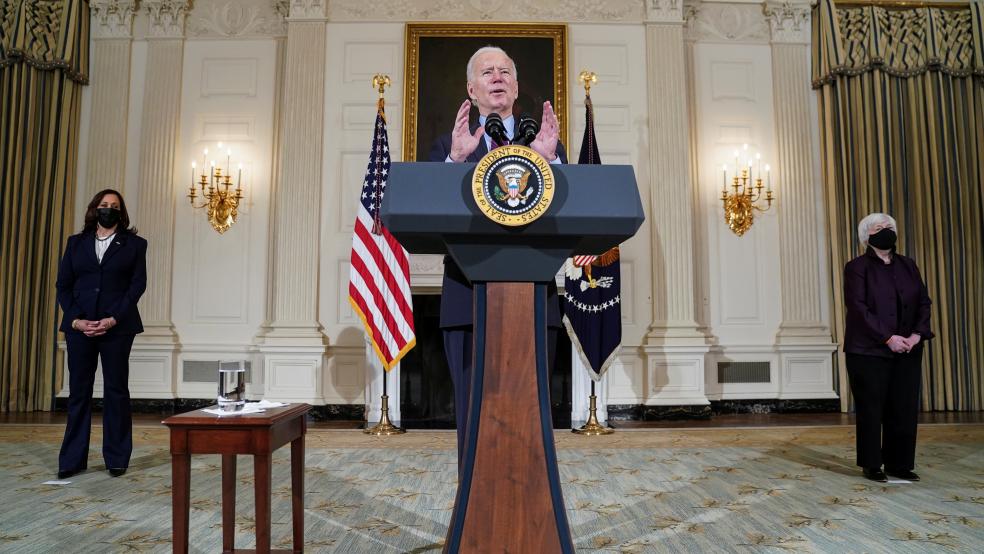President Biden on Friday made a forceful case for his $1.9 trillion Covid rescue package, arguing in a speech to the nation that another weak monthly jobs report demonstrates that the economy urgently needs support on the scale he’s proposing and that, while he wants to act in a bipartisan fashion, Republicans are “just not willing to go as far as I think we have to go.”
Biden said he’s ready to press ahead without GOP backing. “I’m going to act. I’m going to act fast. I’d like to be doing it with the support of Republicans,” he said. “I’ve told both Republicans and Democrats that’s my preference, to work together, but if I have to choose between getting help right now to Americans who are hurting so badly and getting bogged down in a lengthy negotiation or compromising on a bill that’s up to the crisis, that’s an easy choice. I’m going to help the American people who are hurting now.”
Biden and the White House have argued that their package is bipartisan even if congressional Republicans don’t support it, pointing to polling that shows broad backing among voters in both parties. Biden has said he’s willing to negotiate over who would be eligible for relief payments and how that eligibility will be phased out, but he bluntly asserted on Friday that he’s won’t discuss sending out a smaller dollar amount. “I’m not cutting the size of the checks,” he said. “They’re going to be $1,400, period. That’s what the American people were promised.”
Lessons of 2009: Republicans have criticized the Biden plan as too big and too poorly targeted. “It will not serve Americans to pile another huge mountain of debt on our grandkids for policies that even liberal economists say are poorly targeted to current needs,” Senate Minority Leader Mitch McConnell said Thursday.
Biden on Friday pushed back on claims that the U.S. can’t afford another massive Covid bill and on those GOP deficit warnings. “What Republicans have proposed is either to do nothing or not enough,” he said. “All of a sudden, many of them have rediscovered fiscal restraint and the concern for the deficits. But don’t kid yourself, this approach will come with a cost — more pain for more people for longer than has to be.”
He argued that “a growing chorus of top economists — right , center, left” now say that the U.S. can afford to borrow and spend more in order to make productive investments to boost the economy. “The simple truth is, if we make these investments now, with interest rates at historic lows, we’ll generate more growth, higher incomes, a stronger economy, and our nation’s finances will be in a stronger position as well,” he said.
House and Senate pass budget plan: Following a 15-hour, all-night “vote-a-rama,” the Senate Friday morning — just after 5:30 a.m. — approved a budget resolution setting up the reconciliation process that would allow Democrats to pass a Covid relief plan without GOP votes. Vice President Kamala Harris cast the deciding vote to break a party-line 50-50 tie. The House then approved the amended Senate-passed resolution on Friday afternoon in a 219-209 vote largely along party lines.
Legislative committees will now get down to crafting the details of their Covid package and hash out intraparty differences (see more on those below), aiming to produce a result that can be approved by the narrow Democratic majority in the House and get the support of all 50 Senate Democrats.
The targeting of $1,400 relief checks remains one key area under discussion.
Another contentious issue, Biden’s proposed $15 minimum wage, appears likely to be left out of the final package due to Senate rules requiring that any reconciliation measure have an impact on the federal budget. That may help the rest of the package win approval from the likes of Sen. Joe Manchin (D-WV), who has expressed opposition to a $15 minimum wage.
House Speaker Nancy Pelosi (D-CA) said Friday that she hopes to pass the package and send it to the Senate within two weeks, ahead of a mid-March deadline when federal unemployment benefits are set to expire for millions of Americans. She added that Democrats still plan to pursue a “recovery” plan after passing this “rescue” bill. That next phase is expected to center around infrastructure spending and climate change — and to be even larger than the $1.9 trillion Covid bill.





